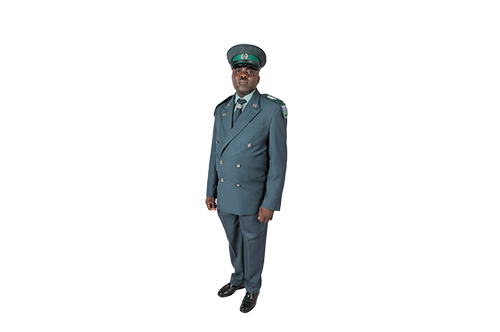Correctional services all over the world are gradually moving from punitive incarceration to the rehabilitation of offenders through efforts to reduce reoffending while providing meaningful reintegration into society.
To this end, it takes individuals with patience and empathy to serve in correctional services. This is the view of Mika Eino Kapweya, a Senior Correctional Logistics Officer in the Namibian Correctional Services (NCS), which was previously known as the Namibian Prison Service (NPS).
“The NCS is a component of the Ministry of Safety and Security, which is mandated to protect the public while assisting offenders to prepare for a law-abiding return to the community,” a visibly proud Kapweya told New Era this week.
He has been in the service of the NCS since 1 September 2011, following a brief stint as a cleaner for the National Art Gallery of Namibia in Windhoek.
Born and bred at the Eunda village in the Omusati region, Kapweya moved to Windhoek in 2005 upon his matriculation from the Ruacana High School.
He then enrolled at the International University of Management (IUM), where he obtained a Certificate in Tourism and Hospitality in 2008.
Unfortunately, he could not continue with his tertiary education due to financial constraints, and was forced to drop out. However, as a self-professed go-getter, he did not allow this misfortune to keep him down and when the chance of a job presented itself, he rose to the occasion.
“It was tough because none of my parents were employed, so I decided to look for a job so that I could support myself. I was fortunate to get a job at the National Art Gallery in Windhoek. I worked as a cleaner for a year, and later got a job at the Electoral Commission of Namibia (ECN), where I worked as a data capturer and verifier until 2011 when I joined the NCS,” he revealed.
Contrary to popular perceptions, Kapweya has it that being in correctional services is more than just enforcing rules and regulations in a prison or jail.
“Most people think being an NCS officer is about locking up offenders. However, there are lots of careers that one can venture into,” he maintained.
As correctional logistics officer, his major role is to keep records of NCS’ logistics as well as to ensure that officers are properly equipped to execute their duties.
“My role is to ensure that the properties of the State are taken care of. I take stock of all the equipment and keep up-to-date inventories. I order and issue uniforms, and ensure that training materials are sufficient during workshops and training sessions,” he noted, adding that he is also responsible for internal and external stock- taking, after which he has report on all irregularities.
In short, Kapweya is responsible for coordinating, consolidating and ensuring the smooth implementation of and adherence to logistics and security, a role he says he is passionate about.
“The decision to become a correctional officer involves honing skills like mental strength and emotional stability,” he says, adding that he subscribes to the code of the NCS, which is to ensure that every inmate is secured in a correctional institution, and that suitable and effective programmes aimed at addressing criminal behaviour are offered.
Moreover, the NCS has proven to be an employer of choice in that it imparts training in critical and emerging security challenges annually to its officers, whose goal is to keep officers refreshed and informed on new procedural, physical, dynamic and intelligence security methods. This keeps the morale of the officers intact, despite other challenges that can be attributed to budgetary constraints.
He debunked as unfounded claims that government employees are unproductive and largely inefficient, citing that the NCS, despite being dogged by ageing infrastructure, is doing its best to ensure that they provide safe and humane custody by providing a healthy and hygienic environment for inmates.
“In this respect, we have established health facilities within all correctional facilities,” he observed.
Another critical aspect of safe and humane custody is food security. For this purpose, the NCS introduced agricultural food production with the dual objective of rehabilitation and food self-sufficiency, including piggery, animal husbandry and crop production.
“These activities curtail inmates’ idleness, teaches them agricultural skills and contributes to food security and the country’s economy,” he continued.
Admittedly, being a correctional officer was not his first career choice. But now that he is within the system, he is determined to grow within the ranks for as long as his faculties serve him right. Queried as to what other career choice he would have been into had he not been bitten by the NCS bug, Kapweya revealed that he would have been a singer.
“I am passionate about singing, and have been leading choirs both in school and church.
My initial dream was to become the best choir conductor in the country. I started choirs in different parts of the country that are still existing to date,” he beamed.


